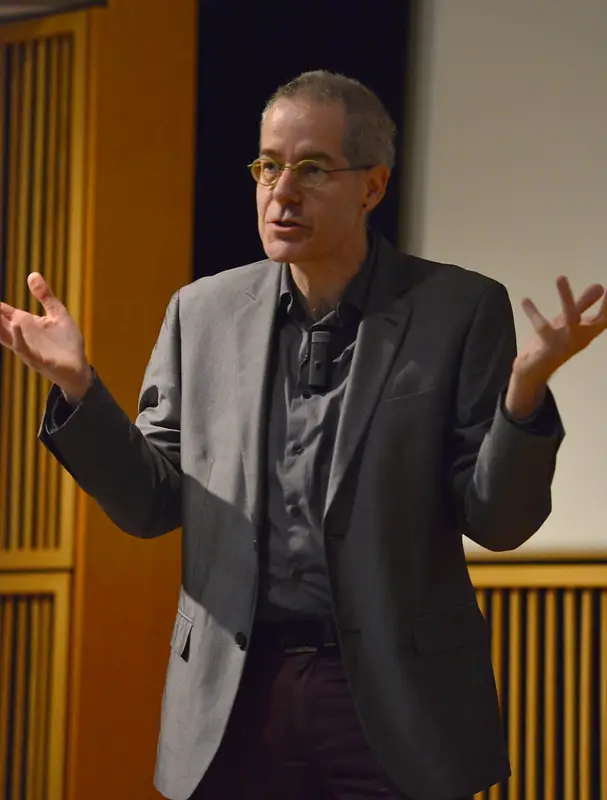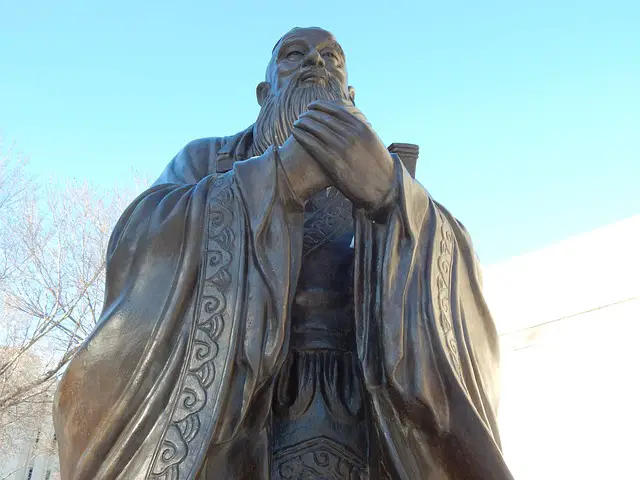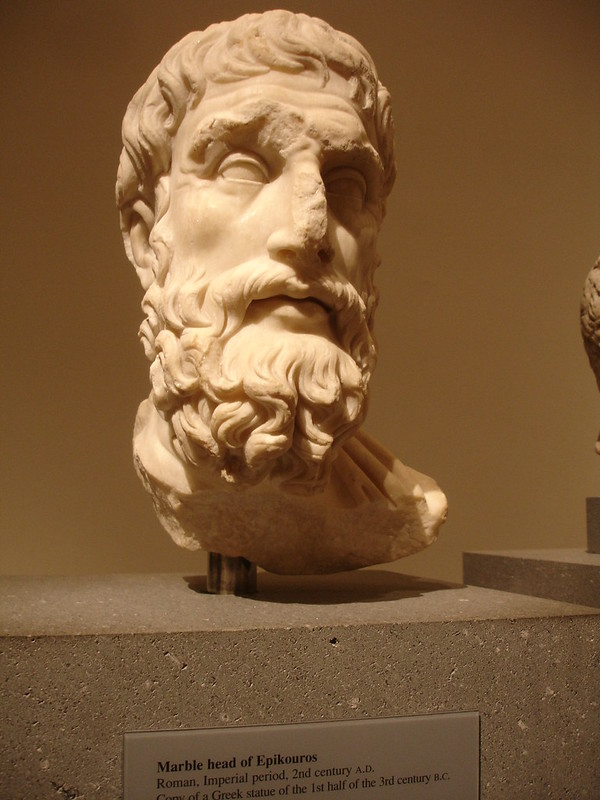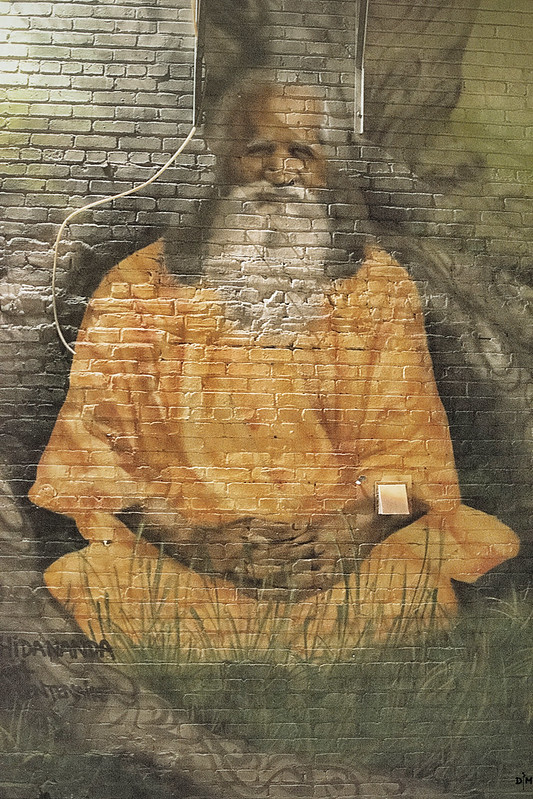Have you adopted a philosophy of living?
This might seem like a difficult question to answer. Of course, this question has been puzzling mankind for thousands of years. We are not just trying to find an answer to the question, “What’s the reason we’re here?” –We are also looking for some answers about how we should spend our time here.
You could of course spend a lifetime without even thinking about them. However, determining a life philosophy and living by it can offer an incredibly sophisticated process. You can have a great adventure by examining in detail many different ideas put forward by the greatest thinkers who have lived in the world. In this summary, you will find 15 different and sometimes complementary thoughts expressed by thinkers who lived in ancient and modern ages, with religious teachings and secular ideas, Eastern and Western science.

Chapter 1 – Ethics is a more important principle than anything else in Buddhism for ancient Eastern philosophy.
Buddhism specialist Owen Flanagan seized an important opportunity in March 2000. He was fortunate that he had a conversation with the Dalai Lama at the top of the Himalayas. Using this chance, Flanagan enthusiastically asked the world-famous Tibetan Buddhist, “what is the ethic of killing someone?”
If a person had the opportunity to kill a cruel leader like Hitler when he took over, would he have the right to do so? The Dalai Lama appealed to the sacred chairmen to consult this question. After reaching a consensus for a few minutes, they gave the following answer: It is ethically appropriate to kill people like Hitler, who is considered cruel. But the Dalai Lama had a warning: “But don’t be angry.”
Ethics is the source of everything in the Buddhist belief. For a Buddhist, the basic philosophy of life is to aim for pleasure in general by relieving people’s agony and torture. In line with this goal, the murder of Hitler is considered ethical. By being at the right level of consciousness, this behavior will be ethical without inclining to anger. Making your goal of relieving agony in the world with compassion, not anger, is the foundation of the ethical pattern.

Buddha, also known as Siddhartha Gautama, is known to have lived in the sixth century BC. He put forward his belief of Buddhism against Indian Brahmanism, which was a common belief before Hinduism. According to the belief of Brahmanism, all beings were in a cycle of birth at the beginning and death at the end. When the life of the living creature ends, its spirit, or what they call it, atman, passes to another being. Only the higher ones who adopted the belief in Brahmanism were immune from this eternal cycle between life and death.
Opposing this belief, Buddha did not accept the idea of atman and argued that living things do not have an eternal soul to be trapped in a cycle. Instead, he stated that everything had an end. Thus, Buddhism advises using as a goal to achieve nirvana or liberation by living virtuous, kind, moral lives rather than trying to get rid of the place where one’s soul is imprisoned.
We need to keep in mind that Buddhism can bring us peace, but that is not the main goal. Buddhism is not a belief that you can personally complete. This belief takes shape in the goodness you do in the world.
Chapter 2 – While Confucianism focuses on people’s relationships with each other, Taoism advises people to behave harmoniously in the world we live in.
We now know that the Buddhist faith cannot be fulfilled by personal effort. It has an outward-oriented perspective. But does this outward orientation destroy the focus that the reality of life requires?
Some Confucian people claimed that this distracted people from the reality of life. According to them, a person who does not put his self in the foreground is like a person who closes his eyes in order not to see his nose. Not seeing does not mean it doesn’t exist.
Confucians argue that you don’t have to ignore the self to live a good life. In the web of human relationships that explain who we are, we must first accept our selves.
Daoism, another of the ancient eastern philosophies, accepts the existence of the individual’s self and draws attention to living in harmony with nature.

Intellectual Bryan Van Norden underlines that in Confucianism we cannot live separately from others. After all, it is our family that makes us born into the world. That is, a good life can be achieved in all good relationships.
There is a tie between us and all the people around us. The philosopher Wang Yangming, a Confucian, said that all normal people worry about a child in a difficult situation. We feel similarly worried about an endangered animal or plant. This concern is due, at one level, to the awareness of our connection to another.
Daoism and Confucianism converge in the idea of connectedness between living things, but Daoism emphasizes nature. According to Daoism, it adopts everything on its own rules and never allows feelings to get in the way of thoughts. You may think that Daoism means just living in nature, but it is beyond that. Our connection with nature can be explained by the problems we encounter while living.
An old story tells how Taoist Dayu responded to an imminent flood. Instead of blocking the flood, he used the flood water to irrigate the field by opening channels in the direction of the flood. Dayu, after grasping and accepting the situation in this way, showed how to dominate the situation.
You can see the modern example of the Taoist mindset in what Professor Robin R. Wang calls “Realtor’s mindset”. A real estate agent negotiates with 30 clients even though he knows that only one person will buy a house from him. Instead of being disappointed with the low sales rate, the realtor learns not to focus on just one client and meets the reality of the business normally.
That is, you cannot always achieve success by going straight ahead. According to Daoism, we must also accept the slopes that stand before us on the road to success.
Chapter 3 – Aristotelianism drives us to progress- but argues that outside influences also do their tasks.
The East was not the only source from which various philosophies emerged in ancient times. Ancient Greek and Roman philosophers also had important ideas about how to lead a good life. Aristotelianism is among these ideas.
Those who adopt the teachings of his famous work, Nicomachean Ethics, in which Aristotle gave his views, are called Aristotelians. According to the author Kaufman, this teaching is practical and straight.
Think of a highly skilled tennis player who can be attributed to the best in the world. If she arises at a time when the competition is not considered crucial, she will never be able to reveal its ability. This tennis player will not have a chance to be successful.
Aristotelianism reveals the inadequacy of plain philosophy as a guide to principles. We all desire to improve, to unleash our talents, and reach our aims as much as possible.
This is called a eudaemonic life, and if you have the opportunity to live such a life, you would be right to be proud.
Unfortunately, not everyone is so lucky to have a life like this- think of that tennis player who was gifted but couldn’t show it. Think of someone who has a family that doesn’t stand behind her, or someone who has lost everything because of a natural disaster.

It is not their fault that these people have trouble making progress. It is difficult to accept this reality. Instead of this modern philosophy of Aristotle, today it is quite common to think that everyone determines his destiny. However, the underlying reality of Aristotelianism is wider.
So, what is needed for a good life? Although outside factors play a role, you should strive to make progress in several areas, not just in one area. For example, an important artist, besides being talented, should always look after his family.
You can strive to live a eudaemonic life by balancing your abilities and powers or aiming for further improvement. To do this, you have to embrace everything as they appear. Success is not just in your hands.
Chapter 4 – Stoicism points out apathy, while Epicurism puts pleasure at the center.
Two opposing philosophies of life were introduced in the classical period: Stoicism in Greece and Epicureanism in Rome found support.
It is Zeno of Citium who founded the Stoicism in Athens around 300 BC. Stoicism advises people to live ethical lives adhering to four righteous principles: practical understanding, bravery, fairness, and moderation.
On the other hand, Epicureanism, established by Epicurus in Rome, progressed by putting one concept at its center: pleasure.
Professor Massimo Pigliucci states that there is also a second side of Stoicism, which already has four principles. According to an Aristotelian, a Stoic must understand that some events in life take place against the will of people. Thus, they strive to improve a state of peace, ataraxia, so they can deal with problems comfortably.
In stoicism, things that cannot be controlled fall into two categories: favorable and unfavorable apathy. Let’s talk about money. Being rich is always desirable but poverty is denied. According to Stoicism, the level of wealth does not determine how virtuous a person is. We’ve witnessed whether a wealthy person is good or bad. So getting rich is “indifferent” and does not affect your good character.

With a Stoic focusing all his attention on indifference, there is less time for negative feelings. Let’s imagine someone slandered you. Before acting in anger, think about why you were being insulted. Is there a right to this? If any, the person who insulted you did you a favor. If not, why would you care about it? The person made a mistake. I don’t think that way because you have to be cold-blooded. In the Stoic approach, there are pragmatic feelings such as cheer and love.
At the heart of Epicureanism, more room is reserved for emotion. It adheres to an ordinary pleasure principle.
We all strive to attain pleasure by creation. Even newborn babies try to find pleasure instead of hunger. The philosopher and writer Hiram Crespo called this the pleasure avoidance faculty. Of course, this is not uncontrolled hedonism – not if we do hedonic calculations. The hedonic calculation is to measure whether something will be enjoyable in the long run.
An epicurean does not consume all of the beers in the fridge overnight. He knows that the hangover and other bad things he experiences after a while will not bring him to the desired pleasure. Also, some choices, such as going to college, maybe a bit troublesome at first, but will become enjoyable in the long run.
Epicureanism cannot find universal solutions to ethical problems. Instead, the best thing he can do is to do a hedonic analysis of everything to enjoy life more. Therefore, do not be nervous about life and keep your smile on your face in every event.
Chapter 5 – Hinduism and Islamic beliefs transfer old views to modern era circumstances.
Up to this section, we have explored the philosophical teachings of having any belief in god, although Buddhism is separated as a religion. But of course, religions based on the existence of a god also have various approaches to a life attributed to people as good.
We know that Hinduism has many conceptions of gods, but the definition of a good life is presented with the understanding of karma. Karma is the system of thinking that determines whether situations we have dealt with can be good or bad, depending on how we behave now or how we were in the past.
In contrast, Islam supports the series of scriptures that reveal God’s word. And in Progressive Islam, humanity is an important understanding placed at the center of everything.
According to Professor Deepak Sarma, the understanding of karma is the central point of the religion of Hinduism. The teaching of karma is completed by reincarnation. Reincarnation refers to the rebirth of a person in another body after death.

As you live on earth, you store good or bad karma depending on whether your behavior is good or bad. With this karma you have stored, you will receive two different answers: The first is about what future events you have not experienced yet will be. The second is about how the new body you will switch to after death will be. For this reason, Hindus commonly state that the good or bad things that happen to them are because of or thanks to the karma they have accumulated.
The highest goal is to get rid of this constant cycle of birth and reincarnation. To achieve this, you must fill your karma with goodness as much as possible. Therefore, in life you spent dealing with good as much as possible, you also suffer for the evil you have done in your present and past life.
We can explain many teachings about life from another deep-rooted belief, Islam. Progressive Islam, one of the branches of Islam, has a recent history compared to other branches.
Dr. Adis Duderija followed Progressive Islam because of its new understanding brought to the Islamic belief. There is no extremism in the teachings of progressive Islam, it stands against social and gender discrimination and adopts beliefs that have become part of the order in the world we live in.
The most important distinguishing feature of progressive Islam is the reason. Since the sacred scriptures are from quite ancient times, they remain outside the scope of modern times.
Therefore, Progressive Islam accepts that it is the mind that develops today’s perception of Islam. These new interpretations, made following modern times, offer important teachings on morality.
For example, there is evidence in the scriptures of Islam that women and men are given equal rights and that the killing of girls is prohibited. These approaches to this equality have already taken place in today’s perception, but they have gone beyond the time they were first proposed. So, by re-examining and interpreting these inscriptions, we must advocate today’s practices for women, adhering to what happens.
Chapter 6 – Both the holy books of Judaism and Christianity give people the chance to study in-depth.
Reinterpreting old scriptures according to the contemporary world is an important necessity in Judaism and Christianity as in Islam. And likewise, these two sacred religions suggest that their interpretation of the scriptures will diversify.
For example, according to Rabbi Barbara Block, the Hebrew Bible is not a writing of philosophy. Rather, it is a book that has been studied in different ways for centuries. And so many different interpretations are the main reason why Judaism is so complicated.
Likewise, according to the intellectual Alister McGrath, Christianity is not the minded collection of some thoughts. This is actually about deliberation, particularly reflecting on the mission of Jesus Christ.
Even the Talmud, an important Jewish scripture, highlights the importance of interpreted ideas. It has a story about Shammai and Hillel Houses. They talk about how to interpret the law correctly. A voice is heard from heaven and demands the idea of the Hillel House be adopted. However, it underlines that “both interpretations are the words of God”. Sometimes we may have to choose from options, but many options may be suitable for us.
Prayer also finds its place in Judaism, but Rabbi Block advises that we should not see prayer as a chain of demands in which we list our wishes. Instead, we should perceive prayer as the food of our soul and an aid to our decisions. For example, in prayer, we can thank God for helping the poor, but it is in our hands to convey that help those in need.

In the Christian religion, finding meaning is left to our will. Christianity is a sequence of points of view rather than a set of rules. Author C. S. Lewis states: “Believing in Christianity is like believing in the rising of the sun. I believe in Christianity not only because I see the sun in the sky, but because I can see everything because of it.”
If so, the questions like “why is there pain?” have many answers. For some, suffering contributes greatly to our development. According to Martin Luther, the pain was the most important reminder that we were mortal. Augustine emphasizes that evil is important because it makes us aware of all that is good.
McGrath’s perspective is that what is experienced after Jesus’ Crucifixion shows how we can deal with the trauma. The sacred writings deal with the processes of regaining hope for Christ’s disciples, who fell into despair after he was killed.
This is a clear example of how the Christian faith, like Judaism, offers us methods of dealing with difficulties in the world without being the norm.
Chapter 7 – Two other philosophies do not include belief in God: Ethical Culture and Secular Humanism.
Traditional religion today is not controlling as it used to be. Some systems of thought were formed that accept some benefits provided by religion without associating with any god.
We should examine the Ethical Culture known as a religion not associated with God. As you understand the characteristics that give it its name, it gives great value to ethics and the culture created by society. Like many religions who have faith in God, a clergyman is appointed to glorify community traditions.
It is Felix Adler who created the Ethical Culture in 1876. Adler’s first goal was to become a rabbi, but he could only give one speech. In his speech, he emphasized the interpreted version of Judaism as a secular one. Since this revolutionary view was not found suitable among the Jews, he could not become a rabbi and took care of himself. The American Transcendentalist Ralph Waldo Emerson’s request for “a church for ethics” was recognized by Ethical Culture.
Reverend Anne Klaeysen admits that there are some defaults with Adler’s teachings, such as sexism. Despite this, many of his thoughts are accepted, such as the belief that people today have great troubles that cannot be dealt with through ancient religions. Adler’s companions endorse papers such as the Universal Declaration of Human Rights, emphasizing our interdependence and responsibility to each other. There is no devotion to any god in Ethical Culture, although it can be said to be visionary.

Secular humanism is not accepted as a religion. It is a current of philosophy that glorifies free thoughts and does not seek certainty. John R. Shook states that like Ethical Culture but without providing a religious background, secular humanism invites people to be responsible for each other. Many philosophical schools support secular humanism, such as Aristotelianism, Stoicism, utilitarianism, and existentialism. You will learn about the teachings of utilitarianism and existentialism in the following chapter.
Putting the mind at the center, secular humanism develops some methods to understand the situation people are in and find solutions. We can say that secular humanism, which takes the mind as a guide, attaches great importance to science.
Separating from other systems of philosophy, secular humanism is not just about determining people’s view of the world. You can offer another approach. However, if you define yourself as spiritual, then a definition like “religious humanist” would be more appropriate for you.
The argument where ethical culture and secular humanism meet is this: spending a good and moral life is not something you can achieve only by believing in God.
Chapter 8 – Existentialism and pragmatism are the set of ideas in which people are independent.
Was it up to you to come to this world? No? The others also did not.
This argument is the starting point of the existentialist philosophy that Jean-Paul Sartre and Simone de Beauvoir formed in the twentieth century. Our birth into this world made us aware and gave us the will to choose. Therefore, as Sartre said, we are “condemned to be free.”
Before existentialism, the Atlantic offered us another non-religious philosophy: American pragmatism. It drew on the ideas of Ralph Waldo Emerson’s self-sufficiency, which also inspired the Ethical Culture. However, according to Emerson, people can only achieve their freedom in some situations.
Skye C. Cleary admits that some inconsistent situations can arise in the philosophy of existentialism. Even being called existentialist misleads us about what this term is about. We should not allow some belief system to categorize us; instead, we have to be who we are. Since people are always open to change and have a complex nature, they cannot be classified under names that limit them.
Sartre tells the story of a waiter who does his job well. Being a waiter explains his work, but people are not programmed to do just one task. Some things are always doomed to change in the future, as in the past.
Based on the change, existentialism is not as pessimistic as it seems. Every person should aim for the next higher version of who he is now and form a conscious life with the freedom he has. At the same time, bonds with other people are valuable as well as our absolute individuality.
Those who created American pragmatism are two Americans, William James, and Charles Peirce. With a very negative examination, it can be compared to existentialism at first. Philosophy is a cause for life or death rather than an intellectual game.

According to John Kaag and Douglas Anderson, the basis of pragmatism is unreliable thoughts about life. We can face great adversity and there is always the possibility of dying. However, it is possible to proceed in the same way to learn how to walk in a hilly place.
James and Peirce tried to achieve this in different ways. Peirce advocated being with society, while James emphasized a personal attitude to life. The common denominator of both is the belief that even if we do not reach the level of perfection, by striving for certain virtues such as goodness, beauty, and truth we will further improve everything we started. We may always feel limited in life, but the freedom to always choose what is good is ours.
Chapter 9 – Effective Altruism is one of our methods of presenting philosophical insights today.
A new philosophy turned the attention directly to the question of how to do the best.
Effective altruism has an easy understanding. It demands supporters to research how they can increase their positive contribution to life. For this, at first, they provided aid organizations as much as they could. Or dealing with professions that are very beneficial to the world.
This modern system of thinking for ethics represents that the question of how to lead a good life is still logical and complicated today.
Effective altruism is a new trend of the twenty-first century, but it is based on the utilitarianism that Jeremy Bentham put forward in the eighteenth century. He notably emphasized that it is necessary to strive for “the highest happiness of so many people”. This prompted Bentham to embrace many progressive ideas, such as standing behind women’s rights, a cause that would benefit many women.
Similarly, effective altruism aims to increase the efficiency of aid activities. You may need to examine charities to know that your aid is being used for a good cause. You may need to have a high-paying job and even share common grounds with other people so that you can help more with the money you earn.

Thus, according to author Kelsey Piper, you can better perceive the current complication of the world and the difficulty of providing insights into moral value. But at the same time, you are encouraged to make a great effort and to do your best.
You might think you were familiar with these thanks to the other philosophical systems we have examined. Yes, you are right! The ideas presented by these 15 thought systems are intertwined, even though some ideas are a thousand years apart, and the places where they originated are far from each other.
You may feel closer to Taoism or Progressive Islam, Stoicism, or existentialism, but these philosophies are interconnected in many ways. The common point in all of them is our desire to make sense of life. But there are also many distinctions between them.
We can be sure that we will bring these questions back to the agenda in the coming years and will receive different responses. These responses will be as effective, integrative, and inconsistent as we have seen in previous chapters.
How to Live a Good Life: A Guide to Choosing Your Personal Philosophy by Massimo Pigliucci, Skye Cleary, Daniel Kaufman Book Review
People have long been questioning how they can lead a fulfilling life. Although the solutions found as a result of these queries are similar in some ways, they have a wide variety of structures. Even if some belief systems are effective in the formation of your life philosophy, you should learn about other philosophies that are put forward for a good life. These thinking systems have many pieces of advice that you can take advantage of.
Determine your philosophy of life.
In this summary, you will find the foundations of the teachings that you can learn throughout your life with different philosophical systems with all their great knowledge. You may have leaned more towards one or two or three of the thoughts we’ve explored so far. Or, you may have felt an urge to learn more. Whatever happens, there is more to look beyond. Now is the time to embark on the adventure of discovering your philosophy of life.
